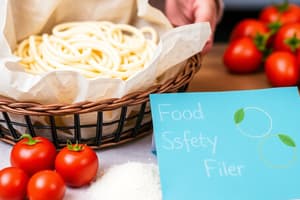Podcast
Questions and Answers
The person in charge is responsible for all of the following except:
The person in charge is responsible for all of the following except:
- Complying with staffs vacation requests (correct)
- Complying with all state and local regulations
- Correctly answer questions regarding food safety
- Training all staff in food safety
In order to continue working, what should a food employee with a minor cut on their hand do?
In order to continue working, what should a food employee with a minor cut on their hand do?
- Cover cut with a water tight bandage and a glove (correct)
- Not allowed to work with minor cut
- Must be checked by a doctor first
- Nothing needs to be done
If a food employee has an infected open wound, the food manager must:
If a food employee has an infected open wound, the food manager must:
- Exclude the employee from working until a letter from a doctor is received
- Allow the employee to work only with salads
- Restrict the employee from working with the open food (correct)
- Send employee to a doctor
All of the following are used to handle ready-to-eat foods except:
All of the following are used to handle ready-to-eat foods except:
It is most important for an employee to use proper hand washing techniques after they:
It is most important for an employee to use proper hand washing techniques after they:
An inspection can occur only:
An inspection can occur only:
An employee must wash their hands in all of the following situations except:
An employee must wash their hands in all of the following situations except:
Where should a food employee take a break to smoke?
Where should a food employee take a break to smoke?
In the food prep area, the only jewelry allowed on an employee's hands or arms is:
In the food prep area, the only jewelry allowed on an employee's hands or arms is:
The chef is allowed to taste test food only if they:
The chef is allowed to taste test food only if they:
All of the following are a hazard to food except:
All of the following are a hazard to food except:
An example of a chemical hazard would not include:
An example of a chemical hazard would not include:
A parasite found in raw or lightly cooked seafood is:
A parasite found in raw or lightly cooked seafood is:
When removing a can from dry storage, you notice the can is swollen. You discard the can immediately due to the risk of:
When removing a can from dry storage, you notice the can is swollen. You discard the can immediately due to the risk of:
The following would be an example of a highly susceptible population:
The following would be an example of a highly susceptible population:
The most common place to find Staphylococcus Aureus is:
The most common place to find Staphylococcus Aureus is:
A major food allergen could include all of the following except:
A major food allergen could include all of the following except:
Hepatitis A can be found in all of the following except:
Hepatitis A can be found in all of the following except:
Ways to prevent a physical hazard include all of the following except:
Ways to prevent a physical hazard include all of the following except:
Flashcards
Person in Charge Responsibilities
Person in Charge Responsibilities
Training staff in food safety and ensuring compliance with regulations.
Handling Minor Cuts on Hand
Handling Minor Cuts on Hand
Cover with a watertight bandage and a glove.
Managing Infected Open Wounds
Managing Infected Open Wounds
Food managers must restrict employees with infected open wounds from handling open food until healed.
Handling Ready-to-Eat Foods
Handling Ready-to-Eat Foods
Signup and view all the flashcards
Importance of Hand Washing
Importance of Hand Washing
Signup and view all the flashcards
Inspection Protocols
Inspection Protocols
Signup and view all the flashcards
Hand Washing Rules
Hand Washing Rules
Signup and view all the flashcards
Designated Smoking Areas
Designated Smoking Areas
Signup and view all the flashcards
Jewelry Restrictions
Jewelry Restrictions
Signup and view all the flashcards
Tasting Food Safely
Tasting Food Safely
Signup and view all the flashcards
Food Hazards
Food Hazards
Signup and view all the flashcards
Chemical Hazards
Chemical Hazards
Signup and view all the flashcards
Anisakiasis
Anisakiasis
Signup and view all the flashcards
Swollen Canned Goods
Swollen Canned Goods
Signup and view all the flashcards
Highly Susceptible Populations
Highly Susceptible Populations
Signup and view all the flashcards
Sources of Staphylococcus Aureus
Sources of Staphylococcus Aureus
Signup and view all the flashcards
Major Food Allergens
Major Food Allergens
Signup and view all the flashcards
Hepatitis A and Contamination
Hepatitis A and Contamination
Signup and view all the flashcards
Preventing Physical Hazards
Preventing Physical Hazards
Signup and view all the flashcards
Study Notes
Responsibilities of the Person in Charge
- In charge of training staff in food safety and ensuring compliance with state and local regulations.
- Does not include managing staff vacation requests.
Handling Minor Injuries
- Food employees with a minor cut on their hand must cover it with a watertight bandage and a glove to continue working.
Management of Open Wounds
- Food managers must restrict employees with infected open wounds from handling open food until they are healed.
Proper Handling of Ready-to-Eat Foods
- Use of bare hands is prohibited when handling ready-to-eat foods; substitutions include tongs, gloved hands, or deli paper.
Importance of Hand Washing
- Hands must be washed properly after using the restroom to prevent contamination.
Inspection Protocols
- Inspections can occur when the facility is open or during reasonable hours, allowing inspectors to evaluate food safety practices.
Hand Washing Rules
- Employees should wash their hands before putting on gloves, after handling raw meat, and after sneezing; washing before mopping the floor is not necessary.
Designated Smoking Areas
- Food employees are required to smoke in designated areas only, ensuring no contamination in food prep areas.
Jewelry Restrictions in Food Prep Areas
- Only plain wedding bands are permitted on employees' hands or arms while working in food prep areas to maintain hygiene.
Tasting Food Safely
- Chefs may taste food using a clean sanitized utensil each time to avoid cross-contamination.
Food Hazards
- Biological, physical, and chemical hazards threaten food safety; environmental hazards do not constitute foodborne risks.
Chemical Hazards
- Examples include improper storage of cleaning compounds and use of toxic materials like pesticides; bone fragments in meat are not a chemical hazard.
Parasites in Seafood
- Anisakiasis is a parasite commonly found in raw or lightly cooked seafood.
Discarding Unsafe Food
- Swollen canned goods should be discarded due to the risk of Clostridium Botulinum, a dangerous toxin.
Highly Susceptible Populations
- Groups at high risk for foodborne illness include elderly individuals living in nursing homes.
Sources of Staphylococcus Aureus
- The most common source of Staphylococcus Aureus is humans, particularly those with skin infections.
Major Food Allergens
- Common allergens include shellfish, peanuts, and soybeans; tree pollen is not considered a food allergen.
Hepatitis A and Contamination
- Hepatitis A can be transmitted through raw shellfish, unwashed hands, and raw vegetables, but not cooked meat.
Preventing Physical Hazards
- Effective hair restraint, minimizing jewelry, and maintaining clean nails help prevent physical hazards; refrigerating hazardous foods does not relate to physical hazards.
Physical Hazards Examples
- Examples of physical hazards include foreign objects that may contaminate food, further emphasizing the need for safety protocols.
Studying That Suits You
Use AI to generate personalized quizzes and flashcards to suit your learning preferences.




